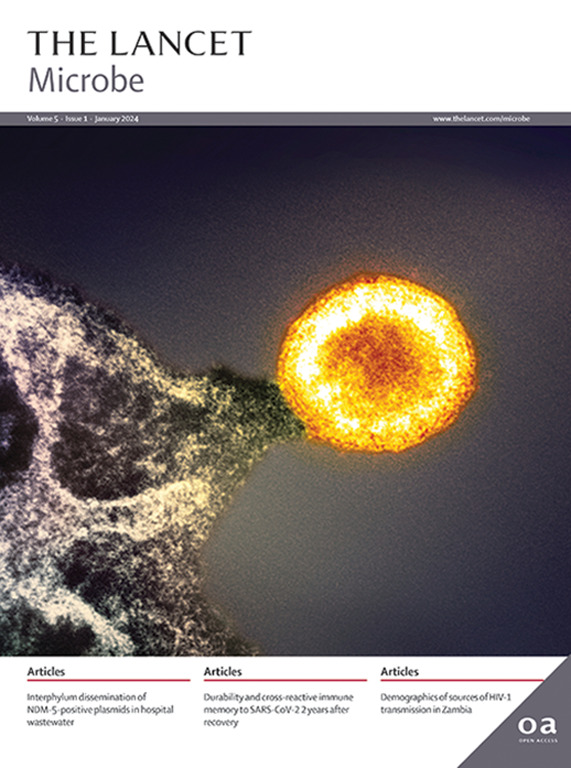基孔肯雅病毒病毒样颗粒(CHIKV VLP)佐剂疫苗在先前接受过其他甲型病毒疫苗与甲型病毒疫苗初始对照者中的安全性和免疫原性:一项开放标签、平行组、年龄匹配、性别匹配的2期随机对照研究
IF 20.9
1区 生物学
Q1 INFECTIOUS DISEASES
引用次数: 0
摘要
背景:顺序接种异源甲型病毒疫苗可能会削弱对甲型病毒疫苗的免疫应答。我们的目的是比较基孔肯雅病毒病毒样颗粒(CHIKV VLP)疫苗在美国以前接受过异源甲型病毒疫苗和甲型病毒幼稚对照者中的免疫原性和安全性。方法:在这项开放标签、平行组、年龄匹配、性别匹配的2期随机对照试验中,该试验在美国的两个临床研究地点进行,受试者为以前接种过委内瑞拉马脑炎病毒研究性疫苗的成年人(18-65岁)(以前的甲病毒疫苗接种者;n=30)和性别匹配和年龄匹配的未接种甲病毒疫苗的对照组(n=30)于第1天肌肉注射1剂40 μg的甲病毒VLP疫苗。免疫原性基于血清中和抗体,通过体外基于荧光素酶的抗chikv NT80中和试验评估。在免疫原性可评估人群中评估的主要免疫原性终点(CHIKV vfp疫苗接种参与者没有重要的方案偏差,没有接受过禁用药物,并提供基线和第22天可评估的血清样本结果)是比较先前甲型病毒疫苗接种者的比例与接种后21天达到血清转化的甲型病毒疫苗未接种对照组的比例(即,研究第22天),基于与基线相比,CHIKV中和抗体增加了四倍。采用Fisher精确检验评估两组比较的显著性。各组血清转化比例采用Wilson法计算95% ci。差异和95% ci基于纽科姆混合评分法计算。以log10转换的滴度作为因变量,以研究组、年龄和性别作为预测因子,拟合方差分析模型。最小二乘均值、差值和95% ci进行反向转换,并报告为几何平均滴度(GMTs)。该试验已在ClinicalTrials.gov注册,编号NCT03992872。研究结果:在2019年11月20日至2021年1月19日期间,60名参与者(20名[33%]女性,40名[67%]男性;白人40人(67%);中位年龄47.0岁[IQR 13.5]), 30名既往甲型病毒疫苗接种者和30名未接种甲型病毒疫苗的对照组,接种了CHIKV VLP,并完成了试验。第22天,两组抗chikv中和抗体血清转化率均为100% (95% CI 88·6-100)。先前的甲型病毒疫苗接种者和未接种甲型病毒疫苗的对照组的GMTs在第22天达到峰值(分别为2032.5 [95% CI 1413.0 - 2923.6]和2299·2 [95% CI 1598·1-3307·8]),并且在第22天和随后的所有访问中,两组之间的GMTs相似。先前的甲型病毒疫苗接种者在第8天的中和抗体增加的比例(93.3% [95% CI 78·7-98·2])比未接种甲型病毒疫苗的对照组(66.7%[48·8-80·8])高4倍;p = 0·021)。先前的甲型病毒疫苗接种者和未接种甲型病毒疫苗的对照组之间的不良事件发生率无统计学意义差异(分别为53.3%和40.0%),尽管该试验的样本量相对较小,限制了检测显着差异的能力,并且没有报告与疫苗相关的严重不良事件。解释:CHIKV VLP疫苗在未接种甲型病毒疫苗的参与者和以前接种过异源甲型病毒疫苗的参与者中具有良好的耐受性和相似的免疫原性。两组间不良事件发生率无显著差异。本研究的结果支持在先前接触甲型病毒疫苗的个体中使用CHIKV VLP疫苗。资助:国防健康计划,紧急旅行健康和巴伐利亚北欧A/S。本文章由计算机程序翻译,如有差异,请以英文原文为准。
Safety and immunogenicity of an adjuvanted chikungunya virus virus-like particle (CHIKV VLP) vaccine in previous recipients of other alphavirus vaccines versus alphavirus vaccine-naive controls: an open-label, parallel-group, age-matched, sex-matched, phase 2 randomised controlled study
Background
Immune responses to alphavirus vaccines might be impaired when heterologous alphavirus vaccines are administered sequentially. We aimed to compare immunogenicity and safety of a chikungunya virus virus-like particle (CHIKV VLP) vaccine in previous recipients of heterologous alphavirus vaccines with alphavirus-naive controls in the USA.
Methods
In this open-label, parallel-group, age-matched, sex-matched, phase 2 randomised controlled trial, which was conducted at two clinical study sites in the USA, adults (aged 18–65 years) who had previously received an investigational Venezuelan equine encephalitis virus vaccine (previous alphavirus vaccine recipients; n=30) and sex-matched and age-matched alphavirus vaccine-naive controls (n=30) were intramuscularly administered one 40 μg dose of CHIKV VLP vaccine on day 1. Immunogenicity was based on serum neutralising antibodies assessed by an in-vitro luciferase-based anti-CHIKV NT80 neutralisation assay. The primary immunogenicity endpoint, which was assessed in the immunogenicity evaluable population (CHIKV VLP-vaccinated participants who had no important protocol deviations, had not received a prohibited medication, and provided evaluable serum sample results for baseline and on day 22), was to compare the proportion of previous alphavirus vaccine recipients with the proportion of alphavirus vaccine-naive controls who reached seroconversion 21 days after vaccination (ie, study day 22) with a single dose of CHIKV VLP vaccine, based on a four-fold increase of CHIKV neutralising antibodies compared with baseline. The significance of the comparison of the two groups was assessed using Fisher’s exact test. The proportion with seroconversion in each group is presented with 95% CIs calculated using the Wilson method. The difference and 95% CIs for this difference was calculated based on Newcombe hybrid score method. An ANOVA model was fit with log10-transformed titre as the dependent variable, and study arm, age, and sex as predictors. Least squares means, difference, and 95% CIs were back-transformed and reported as geometric mean titres (GMTs). This trial is registered with ClinicalTrials.gov, NCT03992872.
Findings
Between Nov 20, 2019, and Jan 19, 2021, 60 participants (20 [33%] female and 40 [67%] male; 40 (67%) White; median age 47·0 years [IQR 13·5]), 30 previous alphavirus vaccine recipients and 30 alphavirus vaccine-naive controls, were enrolled, vaccinated with CHIKV VLP, and completed the trial. The anti-CHIKV neutralising antibody seroconversion rate at day 22 was 100% (95% CI 88·6–100) in both groups. GMTs peaked in previous alphavirus vaccine recipients and alphavirus vaccine-naive controls at day 22 (2032·5 [95% CI 1413·0–2923·6] and 2299·2 [1598·1–3307·8], respectively) and were similar between the groups on day 22 and all subsequent visits. A higher proportion of previous alphavirus vaccine recipients (93·3% [95% CI 78·7–98·2]) had a four-fold neutralising antibody increase at day 8 than did alphavirus vaccine-naive controls (66·7% [48·8–80·8]; p=0·021). There was no statistically significant difference in the incidence of solicited adverse events between the previous alphavirus vaccine recipients and alphavirus vaccine-naive controls (53·3% vs 40·0%, respectively), although the relatively small sample size of the trial limited the power to detect a significant difference, and there were no reported vaccine-related serious adverse events.
Interpretation
CHIKV VLP vaccine was well tolerated and similarly immunogenic in both alphavirus vaccine-naive participants and previous recipients of a heterologous alphavirus vaccine. There were no significant differences in adverse events between the groups. The results of this study support the use of CHIKV VLP vaccine in individuals with previous alphavirus vaccine exposure.
Funding
Defense Health Program, Emergent Travel Health, and Bavarian Nordic A/S.
求助全文
通过发布文献求助,成功后即可免费获取论文全文。
去求助
来源期刊

Lancet Microbe
Multiple-
CiteScore
27.20
自引率
0.80%
发文量
278
审稿时长
6 weeks
期刊介绍:
The Lancet Microbe is a gold open access journal committed to publishing content relevant to clinical microbiologists worldwide, with a focus on studies that advance clinical understanding, challenge the status quo, and advocate change in health policy.
 求助内容:
求助内容: 应助结果提醒方式:
应助结果提醒方式:


